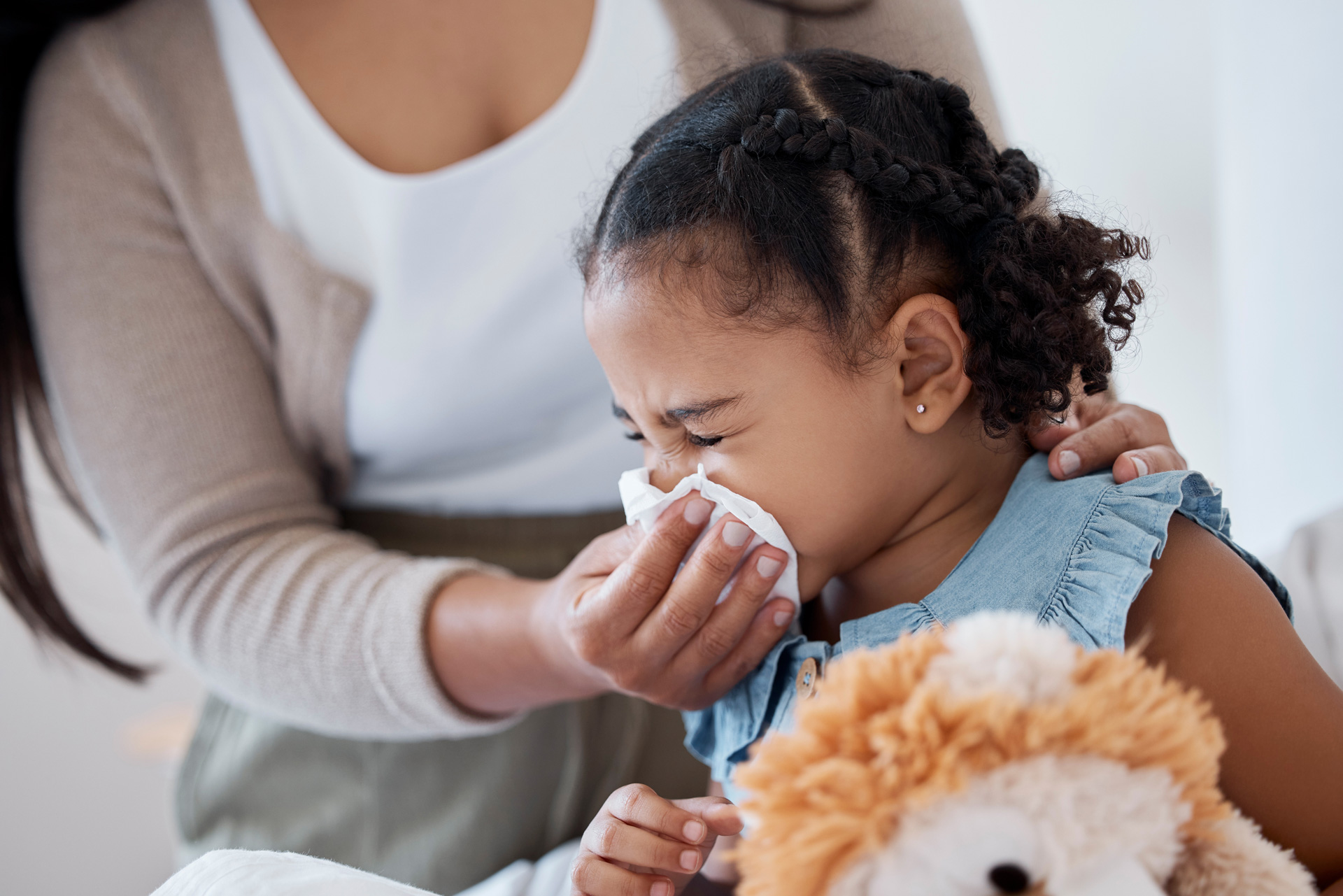Winter brings shorter days, cooler weather, and, unfortunately, more illnesses. Children are especially vulnerable to catching colds, the flu, RSV, strep throat, and other winter infections. Keeping your child healthy during the colder months can be challenging, but with some preventive steps, you can help reduce the risk of illness and ease symptoms when they get sick. Here’s what you need to know to keep your kids healthier this winter.
Common Winter Illnesses in Children
Wintertime illnesses in children are often viral, but some can be bacterial. Understanding these common winter ailments can help you identify symptoms early.
- Colds: Colds are one of the most frequent winter illnesses, marked by sneezing, a runny nose, mild fever, and congestion. Though they’re usually mild, colds can make kids feel pretty miserable.
- Flu (Influenza): The flu can hit hard and fast, bringing fever, chills, body aches, and fatigue. Kids with the flu may have less energy and may need extra rest to recover.
- RSV (Respiratory Syncytial Virus): RSV affects the respiratory tract and is most serious for infants and younger children. It can cause wheezing, coughing, and difficulty breathing, so monitoring symptoms closely is important.
- Strep Throat: Strep throat is a bacterial infection that brings a severe sore throat, fever, and swollen glands. It requires antibiotic treatment, so check with your pediatrician if these symptoms appear.
- Ear Infections: Ear infections often follow colds and can cause ear pain, fever, and irritability. These infections are more common in young children because of their smaller ear anatomy.
Preventive Tips to Keep Kids Healthy
To help your child avoid winter illnesses, encourage good hygiene, healthy habits, and preventive care.
- Handwashing: Make handwashing a priority. Encourage your child to wash their hands frequently with soap and water for at least 20 seconds, especially after school, playtime, and before eating.
- Vaccinations: The flu vaccine is highly recommended each winter to help prevent severe flu symptoms. If your child hasn’t received the flu shot this season, it’s not too late.
- Hydration: Keep your child well-hydrated. Drinking water helps flush toxins from the body and keeps the immune system functioning optimally. Warm beverages like herbal teas can also be comforting.
- Healthy Diet: A nutritious diet is vital to immune health. Include foods rich in vitamins, especially vitamin C, such as oranges, strawberries, and bell peppers. Healthy snacks like yogurt and nuts also support immunity.
- Adequate Sleep: Kids need plenty of rest to fight off germs. Ensure they get the recommended amount of sleep for their age, which is usually 9–12 hours per night for school-aged children.
Reducing Germ Spread in the Home and School
Winter illnesses can spread quickly among children, especially in shared spaces. Here are some ways to limit the spread:
- Disinfect Common Areas: Regularly disinfect high-touch surfaces in your home, like door handles, light switches, and shared toys. This reduces germs that children can pick up.
- Coughing and Sneezing Etiquette: Teach children to cough or sneeze into a tissue or the inside of their elbow. This helps contain germs and keeps them from spreading to surfaces or other kids.
- Avoid Close Contact When Sick: If your child feels unwell, keep them home from school or daycare to prevent spreading illness to others. Avoid playdates or group activities until symptoms subside.
Recognizing Early Symptoms of Winter Illnesses
Knowing what to watch for can help you catch illnesses early and manage symptoms before they become severe.
- Monitor for Fevers: A fever is often the first sign of infection. Track your child’s temperature, and consult your pediatrician if it’s high or persists for more than a couple of days.
- Watch for Breathing Changes: If your child seems unusually tired, has trouble breathing, or wheezes, it may be a sign of a respiratory infection like RSV. Seek medical attention if symptoms are severe.
- Persistent Symptoms: If cold or flu symptoms linger beyond a week or worsen, it may be time to check with your pediatrician. Some cold symptoms can progress into ear infections or pneumonia if not monitored.
Care Tips for When Illness Strikes
Sometimes, despite best efforts, kids still get sick. Here are some at-home care tips to help them recover comfortably.
- Hydration and Rest: Make sure your child stays hydrated by offering water, herbal teas, or diluted fruit juice. Encourage plenty of rest, as sleep helps the body recover more quickly.
- Use a Humidifier: A cool-mist humidifier can help relieve congestion and ease breathing. Be sure to clean the humidifier regularly to prevent mold and bacteria growth.
- Medication for Fever and Discomfort: Over-the-counter fever reducers, like acetaminophen or ibuprofen, can help relieve fever and minor discomfort. Always follow dosing instructions carefully and consult your pediatrician before giving any new medications.
- When to Seek Medical Help: Some symptoms should never be ignored. Contact your doctor if your child has a high fever, difficulty breathing, severe pain, or if symptoms worsen despite care at home.
Staying Ahead of Winter Illnesses
Keeping kids healthy in the winter requires a bit of extra effort, but reducing the risk of illness is worth it. Encourage good habits like handwashing, a balanced diet, and plenty of sleep to support their health. Remember, early intervention is critical. If you’re concerned about any symptoms, reach out to your pediatrician. Together, we can help your child stay happy, healthy, and ready to enjoy the winter season!
If you have any questions or concerns about keeping your child healthy this winter, our team at Community Choice Pediatrics is here to help. Visit our website to schedule an appointment and get personalized advice tailored to your child’s needs. Let’s work together to ensure your child enjoys a healthy, happy winter season!

